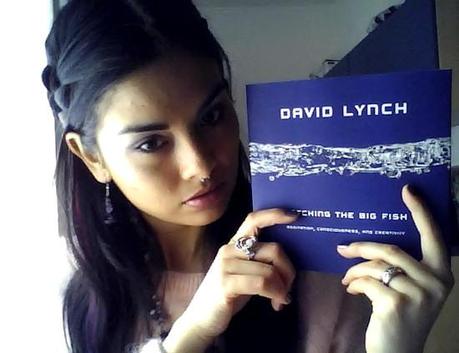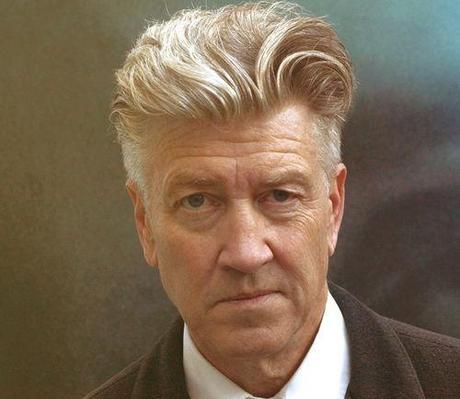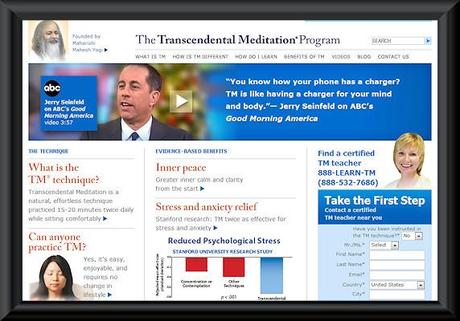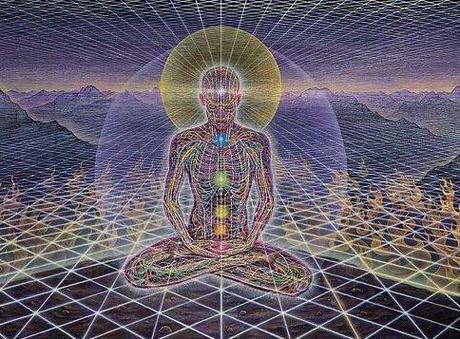
Catching the Big Fish: Meditation, Consciousness and Creativity, by David Lynch.
I spotted this book during my last book hunting expedition to my favorite English-language bookstore in Berlin: Saint Georges in Prenzlauer Berg. Catching the Big Fish: Meditation, Consciousness and Creativity by David Lynch appealed to me not only because I very much enjoy David Lynch’s art and consider him a very interesting person; the thing that attracted me the most was that in the book he talks about how the practice of meditation changed his life and helped him become a more peaceful, happier person, and allowed him to unleash his creativity in a new, more expansive way.Having been considering starting the practice of meditation myself, I thought this would point me in the right direction or give me ideas of where to start and how to approach it. It was an impulsive buy.
The book is divided in brief, easy to read chapters that seem to be conveniently sized to match the duration of a bowel movement, or to be read from the coffee table while you wait for your friend to bring a tray of Earl Grey to the living room. Many chapters start with some excerpts from the Upanishads. Lynch writes in a very straight-forward manner with a language deprived of embellishments or technical words, making it a very accessible read. It is almost as if you were listening to him talking over a damn fine cup of coffee, more than reading a book written by him (David Lynch clarifies that he’s not very good at expressing himself with words, and that’s the reason why he makes movies instead).

David Lynch and his trademark quiff.
There were some interesting bits in it. I especially enjoyed reading about his creative process, and how he develops those complex, obscure ideas that characterize his work. You can find little pieces of insight into how some ideas of his evolved until they ended up becoming Blue Velvet, Twin Peaks, Mulholland Drive and Inland Empire. Lynch shares his ideas on experiencing and interpreting films. He talks about his favorite directors and influences, and gives his views on the artistic life and how to be a successful artist, as well as revealing some of his preferences when it comes to the technical aspects of his films and a brief word of advice for young filmmakers.

"It would be great if the entire film came all at once. But it comes, for me, in fragments. That first fragment is like the Rosetta Stone. It's the piece of the puzzle that indicates the rest. It's a hopeful puzzle piece.
In Blue Velvet, it was red lips, green lawns and the song- Bobby Vinton's version of "Blue Velvet". The next thing was an ear lying in a field. And that was it." - David Lynch.
However, the part I was interested in the most was about his personal experience with meditation and how it changed his life. I completely identified with the opening words from the first chapter, The First Dive:
"When I first heard about meditation, I had zero interest in it. I wasn’t even curious. It sounded like a waste of time.The irony lies in the fact that, throughout the whole book, every time that he talks about meditation and how it transformed his life, he tells you exactly the same thing: that bliss is hidden within you, and if you can access it, it’s great! Which I think sounds kind of mean, since he doesn’t go any further than that.
What got me interested, though, was the phrase “true happiness lies within.” At first I thought it sounded kind of mean, because it doesn’t tell you where the “within” is, or how to get there. But still it had a ring of truth. And I began to think that maybe meditation was a way to go within."
When describing his first experience with meditation, Lynch tells us that he signed up to a Transcendental Meditation Center, sat down, started reciting his personally assigned mantra and then he immediately fell into a unique state of unbounded bliss. While this is a nice story and is good to learn that he managed to solve all his anger issues with a life changing twenty-minute session of Transcendental Meditation, it doesn’t reveal any other useful information of the sort I am looking for.
At some point it even starts to get a bit annoying, since all you are left with is Lynch’s enthusiastic testimonials on how his life got much better, his ideas more original, and how he transformed into a fuller, richer version of himself by doing this kind of meditation, but offering nothing that can really help you or guide you on how to do the same. Except, you know, going to the nearest TM center and dishing out around $1000 for a course, which is definitely something I’m not planning to do. I have my reserves about paying large amounts of money to an association with a dubious reputation selling “enlightenment” for hefty fees to celebrities, or anyone who’s willing to pay; in addition, their website that has all the signs of an infomercial for a miracle product (“Effortless! Anyone can do it! Get rid of stress! Reduce anxiety! You can see benefits from your first session! CALL NOW!”). Finally, Jerry Seinfeld is not exactly my idea of the kind of human being that I would like to become as a result of this.

Uhm...
Another thing that I found off-putting about Lynch’s book is that sometimes he seems to talk in a somewhat authoritative way about certain things, when it’s obvious that he doesn’t have any firsthand experience with it, or in some cases, he just doesn’t know what he’s talking about and just seems to be repeating what he has been told by certain “gurus”.
For example, he claims that TM is the only kind of meditation that will make you dive into this deep ocean of the subconscious:
"Some forms of meditation are just contemplation or concentration: they’ll keep you on the surface. You won’t transcend; you won’t get that fourth state of consciousness and you won’t get that bliss."
Which makes me wonder: how can he be so sure about it, if the only meditative experience he has is using TM? Also, the thought of the Maharishi Yogi being the only person in modern day to have known the way of fully benefiting from meditation is just absurd. It’s like being told that you can only learn a foreign language by studying in a certain school. Yes, different schools might have different styles or be more effective than others at teaching, but the knowledge can still be attained and the skills developed with practice. Meditation is such an ancient and widespread practice that it’s just naïve to think that only one group knows the right way to do it. And when that group owes its existence to steep prices guarding some secretive practice, it becomes even more suspicious.
In any case, if you are REALLY interested in TM, a thirty-minute Googling session will give you most of the info about it, from the tables with mantras used in it, to the steps of the technique itself and even the troubleshooting manual that TM instructors use to guide their trainees. However, be aware that these websites and videos are also filled with complaints from TM instructors and practitioners warning that “it is not possible to learn TM from a book, or from reading information” and some also express their concern about how having access to such information destroys the innocence needed for the novice to fully benefit from the technique. The fact that these people’s livelihoods depends on people paying for learning the technique from them makes me question the objectivity of their claims.
Controversy aside, I ended up doing some research about meditation and how to start practicing it. I will elaborate on my findings in another post. I think I would benefit from it and it would be a necessary step to complement my quest for knowledge. Contrary to my initial idea that meditation was about sitting around trying to think of nothing -which, put in such a simplistic way, sounded like a terrible waste of time-, I have come to the understanding (perhaps still a bit misinformed) that meditating is more about getting rid of the clutter in your mind and all the obstructive negative elements that cloud its brilliance. It’s about restoring a harmony, and finding a way deep into yourself and your essence by reaching beyond your ego, by puncturing through that superficial layer of the mind that is concerned with all the mundane worries and insecure matters of everyday life.

Theologue, by Alex Grey.
So, at least I have to give Mr. Lynch credit for piquing my curiosity on the matter enough for me to decide to take the plunge and start meditating (even if I don’t choose to practice TM).
To summarize, Catching The Big Fish is not a bad book, but it isn’t for everyone either. If you are looking for some sort of guidance when it comes to meditation, or an in-depth account of a personal journey using meditation as a tool for self-improvement that you can apply to your own life, this is not the book for you. I would only recommend it if you are very interested in the work of David Lynch and the alluring dark world that surrounds it. This is a nice, enjoyable book to skim through or to keep on your coffee table for whenever you need a few minutes of constructive entertainment, but don’t expect to get anything groundbreaking from it, either.
Keep searching,
